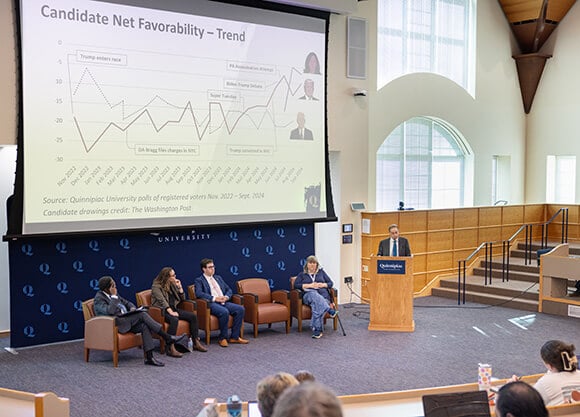
Quinnipiac community takes analytical look at presidential politics in post-election forum
November 08, 2024

November 08, 2024

The event, entitled “Election Reflection: Sense-making and Understanding in the Quinnipiac Community and Beyond,” was the latest entry in the university’s Critical Conversation Series and the first of two planned special sessions covering the election.
David Fryson, interim vice president of the office of equity and inclusion, began the discussion with a brief address, stressing that the event was intended as a “coming together” to “collectively process” Donald Trump’s historic re-election to the nation’s highest office by a margin unforeseen by many of the most reliable sources of political prognostication.
When Trump is sworn in on January 20, he will join Grover Cleveland as a twice-appointed commander-in-chief whose terms occurred nonconsecutively; Cleveland served from 1885-1889, lost the 1888 election to Benjamin Harrison and won the rematch with Harrison in 1892.
“While there can be jubilation when a party wins and a sober reflection when a party loses, we should never lose sight of the fact that the executive ability to lead in our country can only last for four years,” Fryson said. “So when the outcome is not to our liking, we have the ability to change that.”
Doug Schwartz, associate vice president of the Quinnipiac University Polling Institute and director of the Quinnipiac Poll, delivered the first of several brief lectures, sharing relevant findings from recent polls. Trump’s victory, Schwartz said, was largely a reflection of the country’s dissatisfaction with the economy and the perception that the incumbent administration was mostly to blame.
But there were undercurrents, such as an uptick in support among Latinos and young male voters, that conspired to produce a result that perplexed some pundits.
“What no one saw coming was the magnitude of Trump’s win,” Schwartz said, citing, among other factors, his “volatile” favorability ratings in the wake of two impeachments and a felony conviction.
Ryan Hagerman ’25, a public service fellow and the founding chair of the Student Philanthropy Council, outlined Quinnipiac’s college voter outreach efforts and expressed his hope for continuing education on civic matters for the electorate at large. Still, there are lingering concerns about where voters are getting their information, he said.
“I'm really worried that our education system and our digital media environment have somewhat failed our citizens, and I don't know where it goes from here,” Hagerman said. “Media becomes more and more polarized. We see that certain topics become taboo and will become banned in our schools, and I don’t know how we resolve this.”
Hagerman’s remarks served as a fitting segue for a presentation by visiting assistant professor of political science Candice Travis, a political theorist who has extensively studied institutional concepts that sway voters such as populism, nostalgia, nationalism and morality.
Travis posited that the Democrats’ lack of vision contributed to a losing campaign that put too much emphasis on a message of “vote for us because we’re not them” rather than clearly conveying how a Harris presidency would help Americans. But she cautioned against the unproductive cycle of finger-pointing that typically follows such a lopsided defeat at the polls.
“It’s always easy to play the blame game,” Travis said. “All too frequently the first way we make sense of confusing, surprising, unsettling or uncertain moments is to ask: what’s the simplest explanation for this outcome?”
Finally, Christine Chew, director of counseling services for Hartford Healthcare’s CampusCare program at Quinnipiac, shared strategies for managing stress at the culmination of an election cycle that was uncommonly tense and pressurized. A number of resources are available on campus or online through the counseling and mental health services page on the university’s website.
“The reality is the person sitting next to you is the same person who was in there before,” Chew said. “We are in this together. We're on campus together and we're probably more alike than we're different — even if we have different political ideologies. So what I would say is first and foremost, be kind to one another and be kind to yourselves.”
Election Reflection II will take place on November 13, from 4-5 p.m. in the North Haven Auditorium.
Quinnipiac Today is your source for what's happening throughout #BobcatNation. Sign up for our weekly email newsletter to be among the first to know about news, events and members of our Bobcat family who are making a positive difference in our world.
Sign Up Now